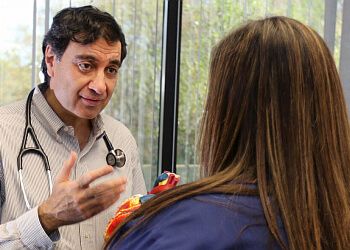
Are you Dr. EHSAN ANSARI? Click to verify and gain editing access.
EHSAN ANSARI MD
Heart Attack, Abnormal Heart Rythms or Arrhythmias, Heart Failure, Heart Valve Disease, Congenital Heart Disease, Chest Pain, Heart Muscle Disease, Pericardial Disease, Aorta & Vascular Disease in Waterbury
Available Timing
- Mon-Fri: 8:30am - 4:30pmSat & Sun: Closed
Clinic/Office Photo

About EHSAN ANSARI
Dr. Ehsan Ansari, a highly qualified cardiologist, practices at Cardiology Associates of Greater Waterbury in Waterbury, Connecticut. He obtained his medical degree from the University of Montpellier School of Medicine and completed his internal medicine residency at Guthrie Clinic in Pennsylvania. Dr. Ehsan Ansari furthered his training with fellowships in cardiovascular medicine and interventional cardiology at Tufts University Hospitals in Massachusetts. He specializes in interventional cardiology, cardiovascular medicine, and nuclear cardiology, focusing on structural heart disease, notably TAVR. A fellow of the American College of Cardiology and a member of the Connecticut State Medical Society and Physician Council, Dr. Ansari also serves as the Medical Director of the Coumadin Clinic. He is affiliated with Saint Mary’s Hospital, Waterbury Hospital, and Yale-New Haven Hospital. The cardiologists at Cardiology Associates of Greater Waterbury offer comprehensive healthcare services. Their cardiac care teams provide advanced diagnostic testing, noninvasive and invasive treatments, cardiac rehabilitation, and preventive education. Noninvasive tests such as stress tests, echocardiograms, and Holter monitors assist physicians in evaluating symptoms and recommending further testing if necessary.